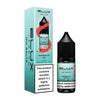Disposable Vape Ban in UK What You Need to Know

Starting from June 1, 2025, the sale and supply of single-use or "disposable" vapes will be prohibited across the UK. This comprehensive ban, implemented by the Department for Environment, Food & Rural Affairs, will apply nationwide, encompassing England, Scotland, Wales, and Northern Ireland. The initiative addresses two critical concerns: the growing environmental waste caused by disposable vapes and the alarming rise in youth vaping rates. We’ll delve into the details of the ban, the reasons behind its introduction, its enforcement strategies, the potential impacts on consumers and businesses, and steps everyone can take to adapt to the changes.
Why Is the UK Banning Disposable Vapes?
Disposable vapes are typically made from mixed plastics, metals and electronics, all sealed in a one-off device that cannot be refilled or recharged. Once discarded, these devices often end up in general waste, where they can leach harmful chemicals into soil and waterways, or even cause fires in waste collections due to damaged lithium-ion batteries. The UK government cites biodiversity loss, resource inefficiency and fire risks as key motivations for the ban. Beyond environmental concerns, there are public health arguments: disposable vapes’ low price point and fruity flavours have made them particularly attractive to children and teens, contributing to an upward trend in under-18 vaping hospital admissions.
What Does the Ban Cover?
Under the new rules, any vape product designed for single use, regardless of whether it contains nicotine, will be prohibited from sale or supply in shops and online from 1 June 2025. The legislation specifically targets devices that:
- Come pre-charged and pre-filled with e-liquid
- Cannot be refilled with e-liquid
- Cannot be recharged or reused once the battery or e-liquid runs out
Devices classified as reusable—those that allow replacement pods or refilling—remain legal, provided they meet existing nicotine product regulations.
Implementation and Enforcement
Enforcement responsibilities will fall to Trading Standards in England, local authorities in Wales and Northern Ireland, and local authorities in Scotland. In the first instance, civil sanctions include stop notices, compliance notices and a fixed fine of £200 for businesses caught selling disposables from 1 June onward. Persistent non-compliance could escalate to an unlimited fine and up to two years’ imprisonment, while police and fire authorities work alongside regulatory bodies to identify offenders. Consumers who already own disposable vapes are not penalised, but they cannot legally purchase or be supplied with new single-use devices.
Potential Impact and Criticisms
While environmental groups have broadly welcomed the ban, some public health experts warn of unintended consequences. An impact assessment by Defra estimates that 29% of current disposable vape users may revert to smoking traditional cigarettes as a result of the ban. Critics also point out that the higher upfront cost of reusable kits might deter lower-income smokers from switching, potentially undermining vaping’s role as a harm-reduction tool. Moreover, some worry that a black market for disposable devices or non-compliant imports could emerge if enforcement proves uneven.
Alternatives to Disposable Vapes
For vapers looking to transition away from single-use products, there are two main categories of reusable options:
- Prefilled Pod Kits: These consist of a rechargeable device and disposable pods, which users click in when the e-liquid runs out. Brands like Vuse and Elf Bar offer prefilled pods that closely mimic the simplicity of disposables, without the whole-device waste.
- Refillable Pod Kits: These allow users to top up pods with bottled e-liquid. While they require more maintenance—refilling tanks and occasionally replacing coils—they significantly reduce waste and long-term cost. Popular manufacturers include GeekVape, Voopoo, and Smok.
What Consumers and Retailers Need to Do
Retailers should:
- Stop ordering new stocks of single-use vapes immediately
- Sell through remaining inventory before June 2025
- Switch to stocking approved reusable vape devices and pods
- Register with an accredited vape recycling service to responsibly dispose of unsold disposables.
Consumers should:
- Familiarise themselves with reusable options now
- Purchase refillable or pod-based kits ahead of the ban
- Use designated vape-battery recycling points for old disposables
Both groups must stay informed via the official GOV.UK updates to ensure compliance and avoid penalties.
Conclusion
The UK’s disposable vape ban represents a significant shift in both environmental and public health policy. By phasing out single-use devices, the government hopes to reduce plastic waste, fire risks, and youth vaping rates. However, as with any major regulation, there will be challenges and unintended effects, most notably the risk of some users returning to smoking. Retailers and vapers alike can prepare by transitioning to reusable pods and kits, staying up to date with guidance, and responsibly recycling old devices. With the deadline of 1 June 2025 fast approaching, now is the time to act and ensure a smooth transition to a more sustainable vaping future.





